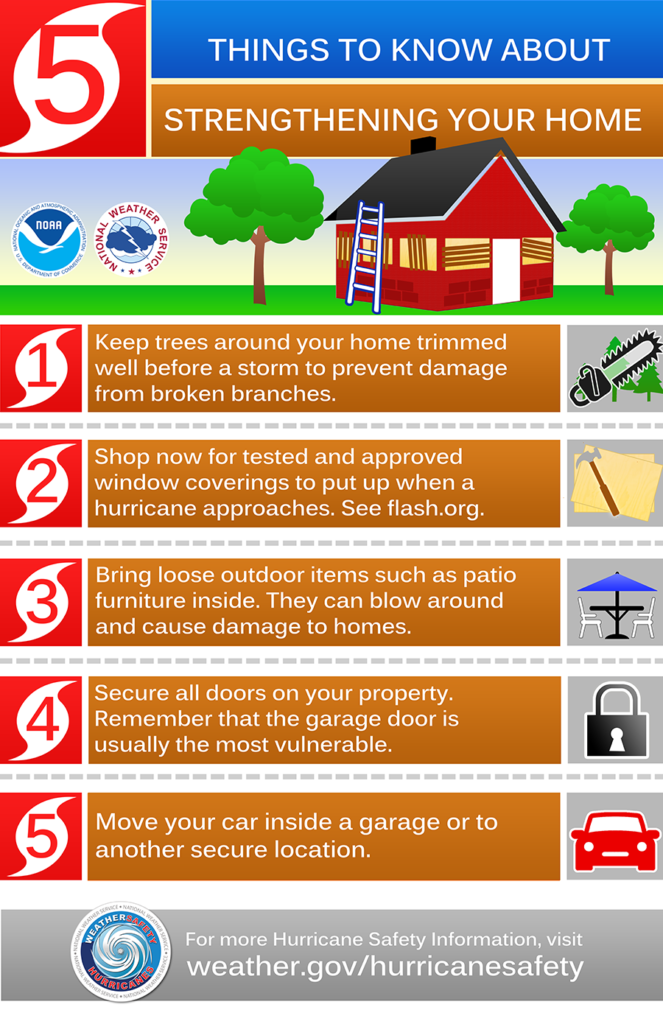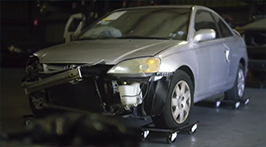A hurricane, or tropical cyclone, is a strong, swirling storm system with sustained winds of over 74 miles per hour. Hurricanes can lead to major property damage and life-threatening hazardous situations, including flooding, storm surge, rains, high winds, and tornadoes. The Atlantic hurricane season lasts from June 1 to November 30, and the majority of hurricanes that affect the U.S. develop during these months when cyclonic action is encouraged by the warm waters of the tropics.
Each year, an average of 10 tropical storms develop in the North Atlantic Ocean, with six storms becoming hurricanes. Approximately five hurricanes will strike the U.S. coastline every three years, with two of the five becoming major hurricanes with winds above 111 miles per hour (a category 3 or higher on the Saffir-Simpson Scale).
Damages from Hurricanes
Hurricane damage is primarily caused by strong winds and heavy rains, with the storms frequently able to uproot trees, shear roofs off of houses, flood entire roads, and lead to a rapid rise in sea level known as a storm surge. Coastal regions are generally at a greater risk of hurricane damage, but all areas hit by a hurricane can experience heavy rains and strong winds lasting anywhere from three days to two weeks.
Some hurricanes in the past have led to major property damage and loss of life. Historical hurricanes of note include:
- Hurricane Camille (U.S.) in 1969 led to at least 259 deaths and $1.42 billion in damages
- Hurricane Gilbert (West Indies, Mexico) in 1988 led to 318 deaths and $40-50 million in damages
- Hurricane Andrew (Bahamas, Florida, Louisiana) in 1992 led to 26 deaths and $27 billion in damages
- Hurricane Charley (Cuba, Florida) in 2004 led to 15 deaths and $15 billion in damages
- Hurricane Katrina (Louisiana, Mississippi, Alabama) in 2005 led to 1,800 deaths and $110 billion in damages
Preparation Before, During, and After a Storm
The National Weather Service will issue a hurricane watch if hurricane conditions may be a threat within 48 hours. A hurricane warning is issued if hurricane conditions are expected within 36 hours. With the proper planning and early preparation, damage from a hurricane can be minimized.

Before:
- Secure windows with storm shutters or plywood
- Close all interior doors and brace all external doors
- Use windowless garage doors that are no wider than 9 feet
- Secure outdoor objects or bring them inside
- Turn off propane tanks
- Fill car gas tanks
- Trim all trees and shrubs
- Unplug small appliances
- Stock up on supplies for an emergency kit, including a 3-5 day supply of food and water, first aid kit, blankets, water-purifying supplies, prescription medications, baby supplies, personal hygiene items, batteries, copies of personal documents, flashlights, etc.
- Evacuate if advised by the authorities
During:
- Use a battery-powered radio or television to receive hurricane updates
- Turn off electrical power when there is standing water, downed power lines, or an evacuation warning
- Keep away from windows, glass doors, and skylights
- Keep curtains and blinds closed
- Stay in a small interior room on the lowest level until authorities declare the storm has passed
After:
- Avoid drinking tap water unless you are sure it isn’t contaminated
- Beware of contaminated buildings or standing water, and stay alert for snakes and insects that may have entered the home during flooding
- Open windows and doors to ventilate your home
- Wash hands after working with debris
- Inspect home for damage and take pictures of the damage for insurance purposes
- Stay alert for gas leaks or damaged electrical wiring and do not light a match or use candles
- Inform local authorities about chemical spills, dead animals, washed out roads, and downed power lines
Additional Hurricane Hazards
The U.S. Federal Emergency Management Agency (FEMA) has outlined certain safety issues that may create new dangers during or after a hurricane. It is important to be aware of the following hazards:
- Carbon monoxide exhaust from portable generators, charcoal grills, and camping stoves can lead to death within minutes if the odorless and colorless exhaust is inhaled. Do not operate the devices near buildings or inside homes or garages.
- Water-damaged carpets, furniture, mattresses, insulation, toys, ceiling tiles, and window treatments can have microorganisms that may cause allergic reactions or infections. Wet items should be thrown out immediately after a flooding situation.
- Wet appliances (electrical or gas) can pose electric shock and fire hazards.
- Medications that have gotten wet should be thrown away.
Sources:
